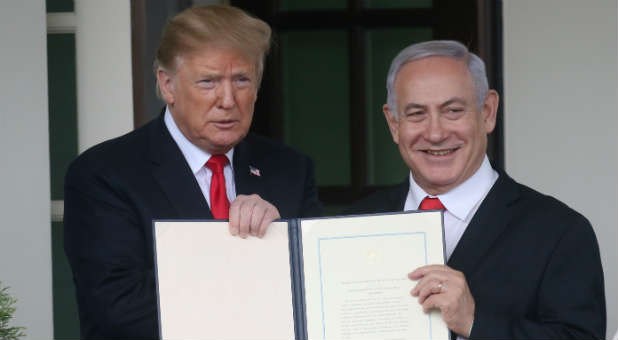Iran’s Plan to Keep Donald Trump From Being Reelected
In October 1980, U.S. President Jimmy Carter was eight points ahead in the Gallup Polls. Things were not going well for Republican candidate Ronald Reagan. He had a series of gaffes, i.e., claiming that California had eliminated its smog; that trees polluted as much as cars; and that Alaska possessed more oil than Saudi Arabia.
Reagan had become bogged down in many controversies regarding everything from Taiwan to Vietnam, the Ku Klux Klan, the stealth bomber program and more. He confused facts and figures constantly. It appeared that Jimmy Carter would easily win a second term despite the issues with his administration that had upset the American people.
Iran, however, had something to say about that. On Sept. 27, 1980, I had dinner in the home of the head of the Mossad, Isser Harel. He had been the individual who masterminded the capture of Adolf Eichmann. With us at the table was Reuven Hecht, senior adviser to prime minister Menachem Begin and also my mentor.
During that evening, I asked Harel if terrorism would ever reach the shores of the U.S. To my astonishment, he explained to us why the first attack would be in New York City on its then-tallest structure, the Empire State Building (the Twin Towers had not been built yet). I was so convinced Harel was correct that I wrote a book and produced a TV special titled Israel, America’s Key to Survival. On the cover, I displayed an American flag being sliced in half by a Saudi sword.
The second question I asked Harel was what would happen to Egyptian president Anwar Sadat. He replied, “We saved his life twice, but at an opportune time, the Muslim Brotherhood will succeed in murdering him.”
I then asked who he thought would win the U.S. presidential election. With no hesitation, his countenance changed, and he whispered, “The Iranians will have something to say about that. When Ronald Reagan places his hand on the Bible on Inauguration Day, the American hostages will be released.”
My phone rang at the exact moment that Ronald Reagan laid his hand on the Bible on January 20, 1981. It was my friend, Reuven Hecht. He shouted, “Harel is a prophet! Can you believe that the hostages have been released?” Harel knew of Iran’s October surprise. I discovered later that Jimmy Carter was trying to buy the hostages’ release.
Carter employed the Algerians in the negotiations and had his secretary of state, Cyrus Vance, handle the matter. Just days before Carter was to leave office, Iran capitulated and agreed to Carter’s demands to pay off loans owed to U.S. banks. In marathon negotiations, the price jumped from $1 billion, $2 billion and up and up. The Iranians refused to release the hostages. Their plan was to defeat Jimmy Carter and manipulate events so that Ronald Reagan would be elected.
New drafts were produced, new documents drawn and the Bank of England was approved as the repository of escrow funds. Shortly after 4:00 a.m. on Inauguration Day, the Carter administration relinquished $7.977 billion to the Iranians. According to one source, the transfer required 14 banks and the participation of five nations acting concurrently.
Why is this important? Iran is, today, doing precisely the same thing as it did in 1980. All the Iranian attacks are intentional. Donald Trump ran for president on two fundamental principles: 1) the economy, and 2) no further wars in the Middle East. The Iranians want U.S. President Donald Trump to attack and will do everything humanly possible to provoke him. They believe an attack on Iran would have a cataclysmic effect on the New York Stock Exchange and would keep Trump from being reelected.
At the same time, they are closely watching what the ayatollahs call the “Little Satan.” The U.S. is the “Great Satan,” and Israel is the “Little Satan.” There is another race looming; that of Prime Minister Benjamin Netanyahu. On Sept. 17, 2019, elections will take place in Israel. The Iranians do not want to do anything to guarantee an attack before that date. In doing so, Netanyahu would be guaranteed another term in office. Israel’s most important priority is security. Thus, Iran will stall until October for their “surprise.”
I have met with Iran’s past president, its foreign minister, more than half its ministers and a number of its mullahs, and there is no doubt in my mind that the Persians—the inventors of chess—have a checkmate planned. The question arises: If this is Iran’s plan, how can Trump, who will spend $1 billion on his campaign, and Netanyahu succeed?
The answer is preemption. Israel must foil Iran’s plan with an attack. It need not be to target Iran’s nuclear project, but rather its ports, refineries and oil platforms. Such an attack would certainly bankrupt the mullahs and make it possible for a generation of innocent Iranians to overthrow the regime.
Israel would also need to launch preemptive attacks on Iran’s proxies—Hamas and Hezbollah—with the knowledge that almost 200,000 Iranian missiles in the possession of both groups would be hurled at the State of Israel.
If Trump provided everything needed by Israel for such an assault, and also if necessary be in a position with coalition assistance to defend America’s interests in the region, he would checkmate the mad mullahs of Iran and ensure a second term as the 45th president of the United States. {eoa}
Mike Evans is a No. 1 New York Times’ bestselling author with 95 published books. He is the founder of Friends of Zion Museum in Jerusalem—of which the late president Shimon Peres was chair. He also serves on the Trump Evangelical Faith Initiative and has 62 million Facebook followers.
This article originally appeared on The Jerusalem Post.














































